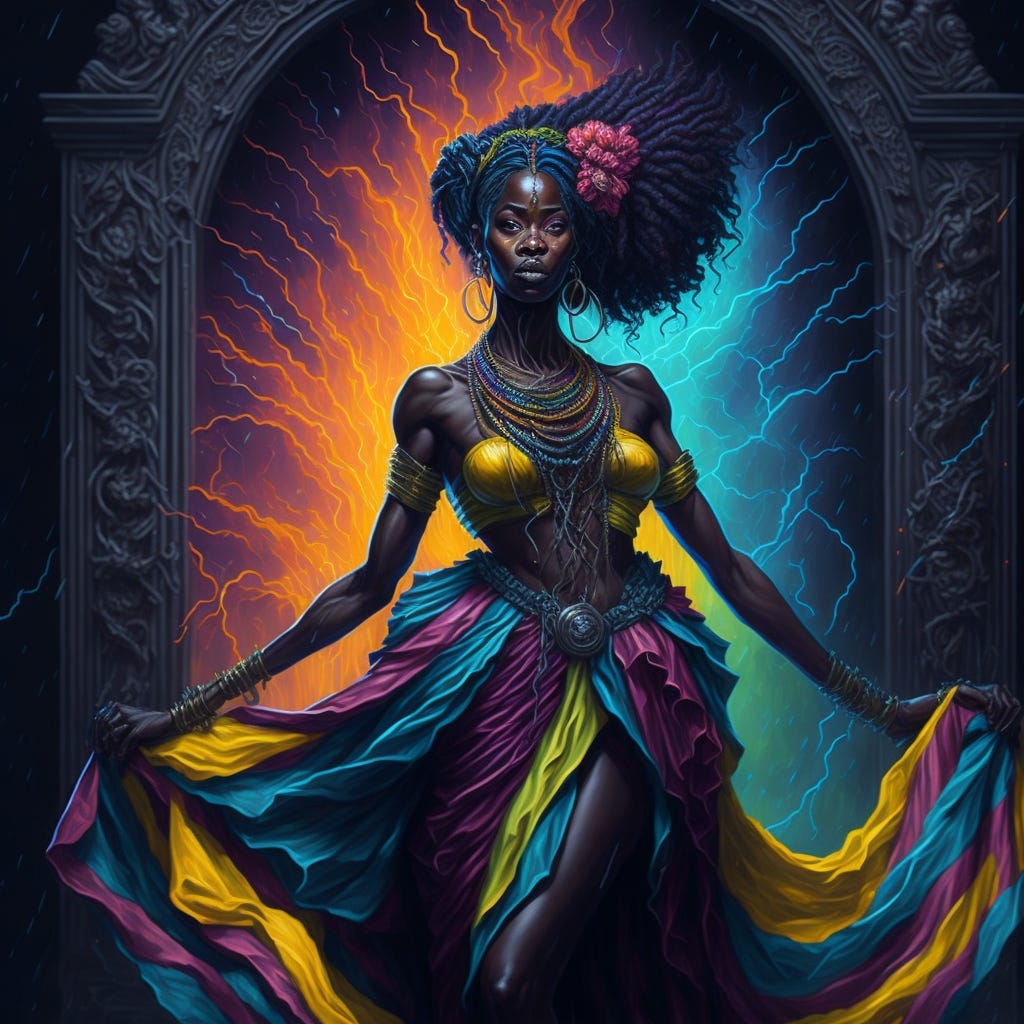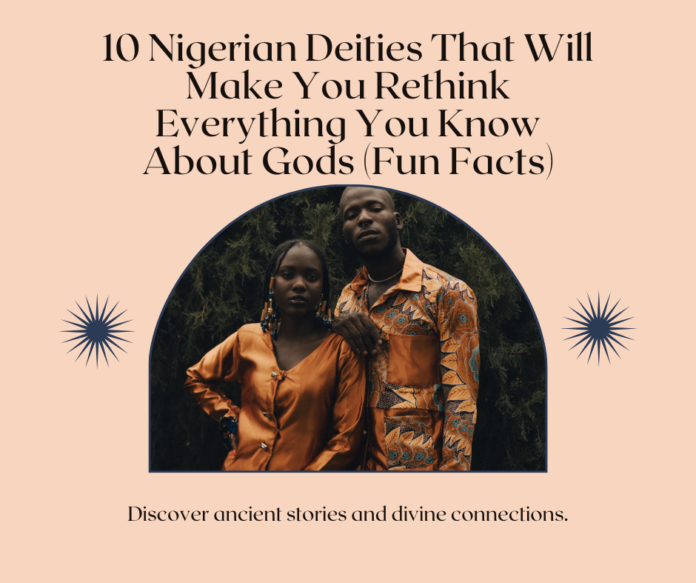Last Updated on April 30, 2024 by Silvy
10 Nigerian Deities That Will Make You Rethink Everything You Know About Gods
Nigeria, the giant of Africa, boasts a rich tapestry of cultures and traditions.
Woven into this vibrant heritage is a fascinating pantheon of deities, each with their own unique stories, powers, and quirks.
Buckle up, history buffs and mythology enthusiasts, because we’re about to embark on a mind-blowing journey through the world of Nigerian deities.
Forget the stereotypical portrayals of gods as distant, all-powerful beings. Here, you’ll encounter deities who are downright relatable, sometimes mischievous, and often deeply intertwined with the everyday lives of Nigerians.
So, grab your metaphorical cup of palm wine (a traditional Nigerian drink) and get ready to have your preconceptions about gods shattered.
Here are 10 Nigerian deities that will leave you utterly amazed:
#1. Obatala: The Architect of Creation
Obatala, the revered creator god in Yoruba mythology, is often depicted as an old, white-bearded man.
He’s credited with molding the earth from formless clay and breathing life into humanity. But here’s the interesting twist: Obatala isn’t alone in the creation story.

#2. Oduduwa: The First King of the Yoruba
Oduduwa, another crucial figure, is said to have descended from the heavens alongside Obatala.
Together, they worked to create the world, with Oduduwa establishing the first Yoruba kingdom, Ile-Ife.
This fascinating interplay between the divine and the earthly sets the stage for the richness of Nigerian mythology.

#3. Ogun: The Fierce God of Iron and War
Move over, Ares! Ogun, the Yoruba god of iron, war, and blacksmithing, is a force to be reckoned with.
He’s often depicted as a muscular warrior, wielding powerful tools and radiating an aura of strength and determination.
Interestingly, Ogun is also seen as a patron of creativity and innovation, highlighting the multifaceted nature of Nigerian deities.
#4. Sango: The Thundering King
If you’re looking for a deity with a bit of rockstar swagger, then Sango is your guy. This powerful Yoruba god is associated with thunder, lightning, and justice.
He’s known for his fiery temper and dramatic displays of power, often arriving in a blazing chariot pulled by stallions.
Sango festivals are vibrant affairs, filled with drumming, dancing, and a celebration of this larger-than-life deity.

5. Oya: The Powerful Warrior Queen
Shango wouldn’t be complete without his formidable wife, Oya. This fierce warrior queen is associated with the wind, lightning, and the Niger River.
Often depicted riding a whirlwind, Oya protects women in childbirth and is a symbol of female strength and power.

#6. Amadioha: The Igbo God of Thunder and Justice
The Igbo people, another major ethnic group in Nigeria, have their own captivating deities. Amadioha, the almighty god of thunder and justice, is a prominent figure.
He’s seen as the upholder of moral law, ensuring that wrongdoers are punished. Interestingly, thunderstorms are often seen as a manifestation of Amadioha’s anger.

7. Ani: The Earth Mother
While Amadioha reigns supreme in the sky, Ani, the Igbo Earth Mother, holds dominion over the land. She’s associated with fertility, morality, and the ancestors.
Offerings are made to Ani to ensure bountiful harvests and to appease the spirits of those who have passed on.

8. Egungun: The Ancestral Spirits
Speaking of ancestors, the Egungun are a fascinating concept in Yoruba mythology. These are the spirits of the deceased who are believed to return to the world of the living during special festivals.
Elaborate masquerades, often depicting the deceased, are held to honor and appease the Egungun.
#9. Malokun: The Yoruba God of Wealth and Prosperity
Money doesn’t grow on trees in Nigeria, but according to Yoruba beliefs, it might come from the blessings of Malokun.
This fascinating deity is associated with wealth, prosperity, and trade. He’s often depicted as a portly figure, adorned with symbols of wealth and abundance.
Offerings are made to Malokun in the hope of securing financial success.

#10. Osun: The Goddess of Love, Beauty, and Fertility
Looking for a love potion recipe? In Yoruba mythology, Osun might be your gal. This beautiful goddess is associated with love, sensuality, beauty, and fertility.
She’s said to reside in the rivers, and her worship is often linked to the use of freshwater for purification and rituals.
Osun festivals are vibrant celebrations filled with singing, dancing, and offerings to the goddess.
Beyond the Names: Exploring the Significance of Nigerian Deities
These are just a taste of the captivating pantheon of Nigerian deities. What truly sets them apart is their deep connection to the everyday lives of Nigerians.
These deities aren’t distant figures on Mount Olympus; they are woven into the fabric of society, influencing everything from agriculture and warfare to love and creativity.
Here’s a deeper look at the significance of Nigerian deities:
-
Moral Guardians: Many Nigerian deities, like Amadioha and Ani, serve as moral compasses, ensuring that people uphold ethical codes and face consequences for wrongdoing.
-
Protectors and Providers: Deities like Ogun and Oshun offer protection and blessings in various aspects of life, from warfare and wealth to love and fertility.
-
Connection to Nature: The natural world plays a vital role in Nigerian mythology. Deities like Oya and Ani represent powerful forces of nature, fostering respect for the environment.
-
Ancestral Veneration: The concept of Egungun highlights the deep respect Nigerians have for their ancestors, who are believed to watch over and guide the living.
Understanding the Nuances: A Glimpse into Different Ethnicities
While we’ve focused on Yoruba and Igbo deities, Nigeria is a land of rich ethnic diversity. Each group has its own unique pantheon, reflecting their cultural practices and beliefs. Exploring these variations can be a fascinating journey.
For example, the Ijaw people worship deities like Egbesu, associated with war and justice, while the Esan people revere Ovia, the creator god.
Understanding these diverse traditions paints a more complete picture of the Nigerian spiritual landscape.
Intrigued? Dive Deeper into the World of Nigerian Deities!
Hopefully, this whirlwind tour has sparked your curiosity about Nigerian deities. There’s so much more to discover! Here are some ways to delve deeper:
-
Explore Museums and Cultural Centers: Many Nigerian museums and cultural centers showcase artifacts and artwork related to deities.
-
Attend Festivals: Immerse yourself in the vibrant energy of Nigerian festivals dedicated to specific deities. Witness the music, dance, and rituals firsthand.
-
Read Books and Articles: Delve into books and articles written by Nigerian scholars and mythology enthusiasts. Gain a deeper understanding of the stories and symbolism behind the deities.
By exploring the world of Nigerian deities, you’ll gain a richer appreciation for Nigerian culture, history, and the enduring power of storytelling.
Frequently Asked Questions (FAQs)
Are there any similarities between Nigerian deities and deities from other cultures?
Absolutely! Themes of creation, war, love, and nature are common across many mythologies worldwide. You might find parallels between Nigerian deities and figures from Greek, Roman, or Egyptian mythology.
Do people in Nigeria still worship these deities?
Traditional religions are still practiced in Nigeria, and many people incorporate beliefs related to deities into their daily lives. However, Christianity and Islam are also prominent religions in the country.
What is the significance of masquerades in Nigerian mythology?
Masquerades play a crucial role in honoring and appeasing ancestral spirits and certain deities like Egungun. They serve as a bridge between the spiritual and physical worlds.
How has Nigerian mythology influenced art and literature?
Deities and their stories are a constant source of inspiration for Nigerian artists, writers, and musicians. Their influence can be seen in sculptures, masks, songs, and even contemporary literature.
Is it appropriate for non-Nigerians to learn about Nigerian deities?
Absolutely! Learning about different mythologies fosters cultural understanding and appreciation. Approach the topic with respect and a desire to learn.
Verified Sources:
- Yoruba Religion: https://en.wikipedia.org/wiki/Yoruba_religion
Nigerian deities continue to hold a special place in the hearts and minds of many Nigerians.
Their stories are passed down through generations, reminding people of their heritage and the values that have shaped their society.
Here’s a glimpse of how Nigerian deities remain relevant in the modern world:
-
Contemporary Art and Music: Modern Nigerian artists and musicians often draw inspiration from deities and mythology. Their works reimagine traditional stories and characters for a contemporary audience.
-
Diasporic Connections: The African diaspora, particularly in the Americas and the Caribbean, carries echoes of Nigerian mythology. Deities like Oshun and Ogun are incorporated into spiritual practices and cultural expressions.
-
Symbolism and Identity: Nigerian deities continue to be potent symbols of identity and cultural pride. Their images and stories are used in fashion, literature, and even advertising, reminding Nigerians of their rich heritage.
In conclusion, Nigerian deities are far more than just characters in ancient stories. They are living embodiments of cultural values, powerful forces of nature, and a testament to the enduring human capacity for storytelling.
So, the next time you hear the rumble of thunder or witness the beauty of a flowing river, remember, you might just be experiencing the echoes of a Nigerian deity in the modern world.


